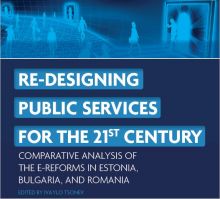Long queues, limited working hours, crippling bureaucracy, lost or damaged papers and ultimately remaining unheard when reaching out to the public administration. A story, most can relate to. Many still face the bureaucratic hurdles on a daily basis, but others have completely crossed them out. The introduction of ICT in governance brought about a new level of public services, making all aspects of public action more effective, transparent, and immediate, whilst greatly reducing costs. This justifies cautious optimism for the future of governance. Aiming at fostering a comprehensive inclusion of ICT in state governance, and its greater political and public acceptance, this publication highlights the success story of Estonia, which has turned The State into a service, with 99% of the administrative services provided on-line. The presentation of the triggering factors behind the establishment of e-Estonia, the principles, and components of the e-based state’s governance outline the core philosophy behind the re-design of public services. Motivated to compare and provide an unbiased picture two additional cases of countries experiencing greater challenges in their e-reforms and enjoying a far less resounding success, have been presented. In the course of preparation of this publication, the European Liberal Forum, with the support of the Friedrich Naumann Foundation for Freedom Southeast Europe, organised two thematic expert workshops in Sofia and Bucharest, and an international conference in Sofia, whose findings proved a source of inspiration to the authors. In the future, the organisations involved in this project will continue to collaborate on projects promoting e-solutions for a better governance and I hope you will stay by our side in this mission. Wishing you a pleasant reading of the diverse countries’ perspectives, available in three different language editions.
